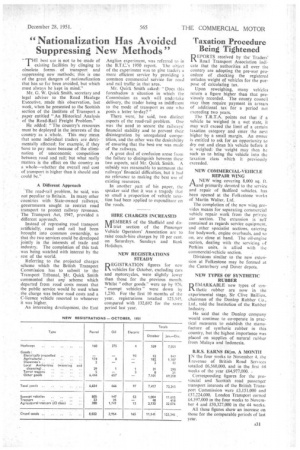"Nationalization Has Avoided Suppressing New Methods"
Page 33

If you've noticed an error in this article please click here to report it so we can fix it.
" THE best use is not to be made of existing facilities by clinging to obsolete forms.. of transport and suppressing new methods; this is one of the great dangers of nationalization that has so far been avoided, but which must always be kept in mind."
Mr. G. W. Quick Smith, secretary and legal adviser to the Road Haulage Executive, Made this observation, last week, when he presented to the Scottish section of the Institute of Transport a paper entitled "An Historical Analysis of the Road-Rail Freight Problem."
He added: "The country's resources must be deployed in the interests of the country as a.whole. This may mean that some individual traders are detrimentally affected; for example, if they have to pay more because of the elimination of uneconomic competition between road and rail; but what really matters is the effect on the country as a whole—whether the overall real cost of transport is higher than it should and could be."
A Different Approach The road-rail problem, he said, was not peculiar to Britain. In many other countries with State-owned railways, governments sought to restrict• road transport to protect railway revenues. The Transport Act, 1947, provided a different approach.
Instead of repressing road transport artificially, road and rail had been brought into common ownership, so that the two services could be developed jointly in the interests of trade and Industry. The completion of this task was being watched with interest by the rest of the world.
Referring to the projected charges scheme which the British Transport Commission has to submit to the Transport Tribunal, Mr. Quick Smith commented that any scheme which departed from road costs meant that the public service would be used when the charge was below road costs and a C-licence vehicle resorted to whenever it was higher.
An interesting development, the East Anglian experiment, was referred to in the 13.T.C.'s 1950 report. The object of the experiment was to give traders a more efficient service by providing a common commercial service for road and rail traffic in that area.
Mr. Quick Smith asked: " Does this foreshadow a situation in which the Commission as such will undertake delivery, the trader being as indifferent to the mode of transport as one who posts a letter to-day7" There, were, he said, two distinct aspects of the road-rail problem. One was the need to secure' the railways' financial stability and to prevent their disintegration by unregulated competition, and the other was the desirability of ensuring that the bestuse was made of the railways.
A great deal of confusion arose from the failure to distinguish between these two aspects, said Mr. Quick Smith. A subsidy was reasonable to surmount the railways' financial difficulties, but it had no relevance to making the best use of existing resources.
In another part of his paper, the speaker said that it was a tragedy that so small a proportion of vehicle taxation had been applied to expenditure on the roads.
HIRE CHARGES INCREASED NAEMBERS of the Sheffield and ells trict section of the Passenger Vehicle Operators' Association are to raise coach-hire charges by 10 per cent. on Saturdays, Sundays and Bank Holidays.
NEW REGISTRATIONS STEADY REG' ISTRATION figures for new vehicles for October, excluding cars and motorcycles, were slightly lower than those for the previous month. Whilst "other goods" were up by 926, " exempt vehicles" were down by 1,230. For the first 10 months of the year, registrations totalled 123,345, compared with 132,692 for the same period last year.












































































